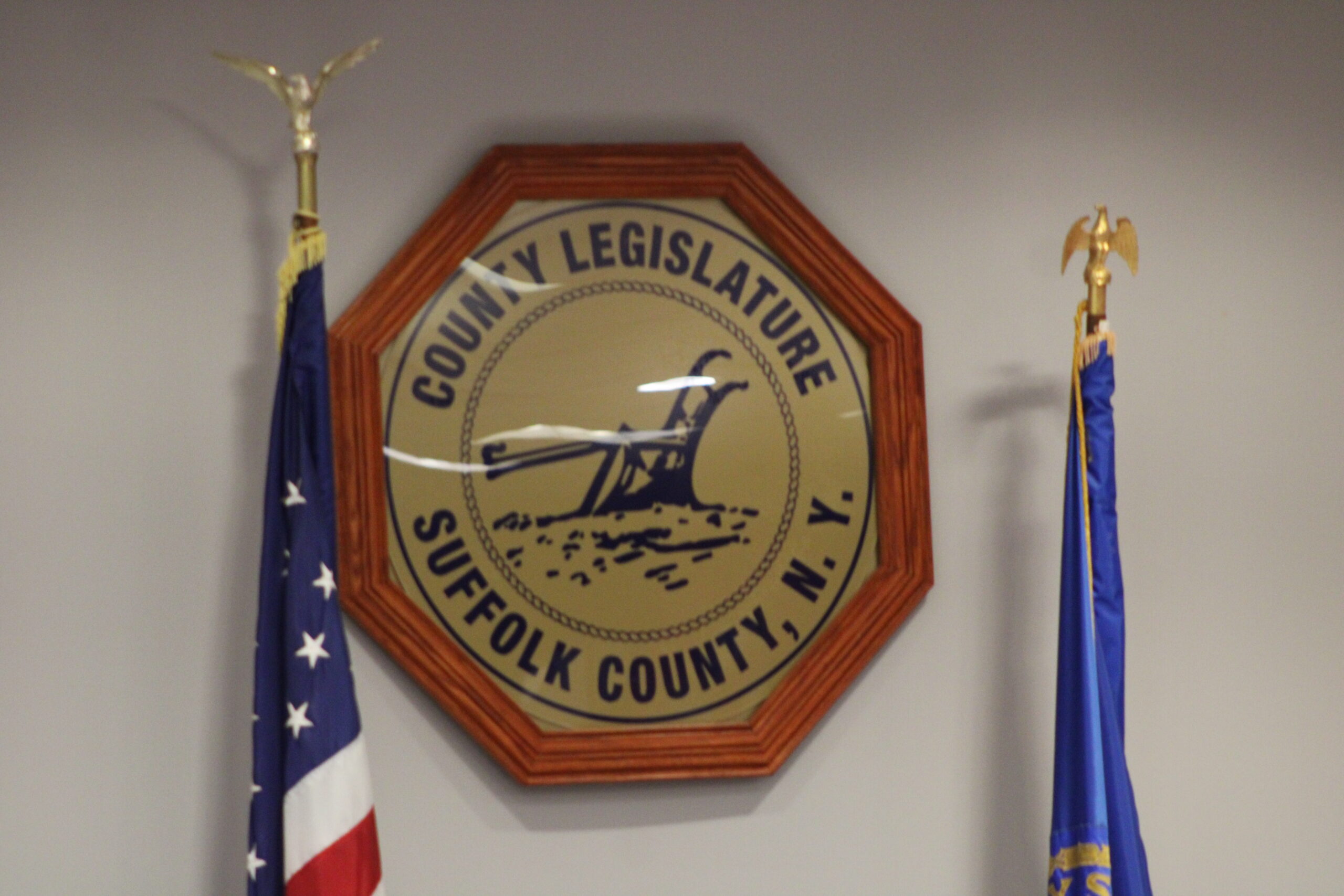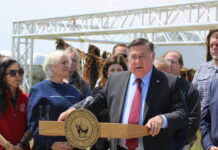Photo credit: Matt Meduri
In what has been a years-long process, temporarily halted by deliberations last summer, the Suffolk County Legislature has finally moved to put the Suffolk County Water Quality Restoration Act on the November ballot as a proposition.
Studies have been conducted on Suffolk County’s precarious wastewater system and natural environment. Nitrogen levels, algal blooms, brown and red tides, agriculture and aquaculture, and landmark tourist attractions delicately coalesce around reaching sound wastewater solutions, with a dangerous cocktail on deck if not properly addressed.
Wastewater infrastructures are currently funded by a quarter-percent sales tax in Suffolk County, colloquially known as the “quarter-percent fund.” Last summer, the Legislature was presented with a plan to institute a one-eighth-percent sales tax on top of the existing quarter-percent fund to guarantee wastewater funding through 2060. Since the County Legislature cannot levy sales taxes, the initiative had to be passed in the state legislature and signed by Governor Kathy Hochul (D). The Governor made the trip to Captree Island last month to sign the bill, allowing the Legislature to vote to put the referendum in front of voters this fall.
Last summer, the Legislature voted to recess the measure as many in the horseshoe did not feel comfortable with the allocations, with 75% of projected revenues going to Innovative Alternative Wastewater (I/A) Systems, 10% going to administrative fees, and the remaining 15% possibly going to sewers, although the word “sewer” was conspicuously absent from the text.
With the new administration of County Executive Ed Romaine (R-Center Moriches) and members of the Legislature, a new proposal, I.R. 1461, which stipulates a 50-50 split between sewers and I/A systems, was formed as the compromise solution.
The Legislature voted to put the measure on the ballot at their Tuesday general meeting in Riverhead. The bill will enter another public portion before receiving a signature from County Executive Romaine.
Residents and stakeholders spoke before the vote during the public portion.
“My main concern is that the one-eighth-percent sales tax is nowhere near enough [to fund wastewater solutions in Suffolk County],” said Steven Green. “From what I have read, it’s not taking into account the volume of water. While I understand the treatment of septic systems and sewers are very important, and I agree with that, we’re neglecting to add to the discussion how to deal with the sheer amount of water being put into the ground, which I think is equally as important as the water quality restoration.”
Kevin McDonald, Conservation Project Director for Public Lands with the Nature Conservancy, spoke on behalf of his organization, as well as Save the Sound, the Peconic Baykeeper, and the Seatuck Environmentalist Association.
“Like many things that are worth doing, sometimes it isn’t easy. We all agree that 1461 should be passed at your swiftest opportunity,” said McDonald. “It’s so well documented, there are other places in the country now looking at how we came to this place and how they can replicate this solution.”
Adrienne Esposito, Executive Director for Citizens Campaign for the Environment, spoke in support of I.R. 1461.
“We appreciate the thoughtful discussion, the input, and working collaboratively together to come up with a plan that really will change the direction of Suffolk County’s future, environment, and water resources,” said Esposito. “This is a nation-leading plan that is based on sound science and good common sense. We like to say good science and good common sense yield good policy, and that’s exactly what we have before us today.”
The Legislators then stated their positions and reasonings before the vote.
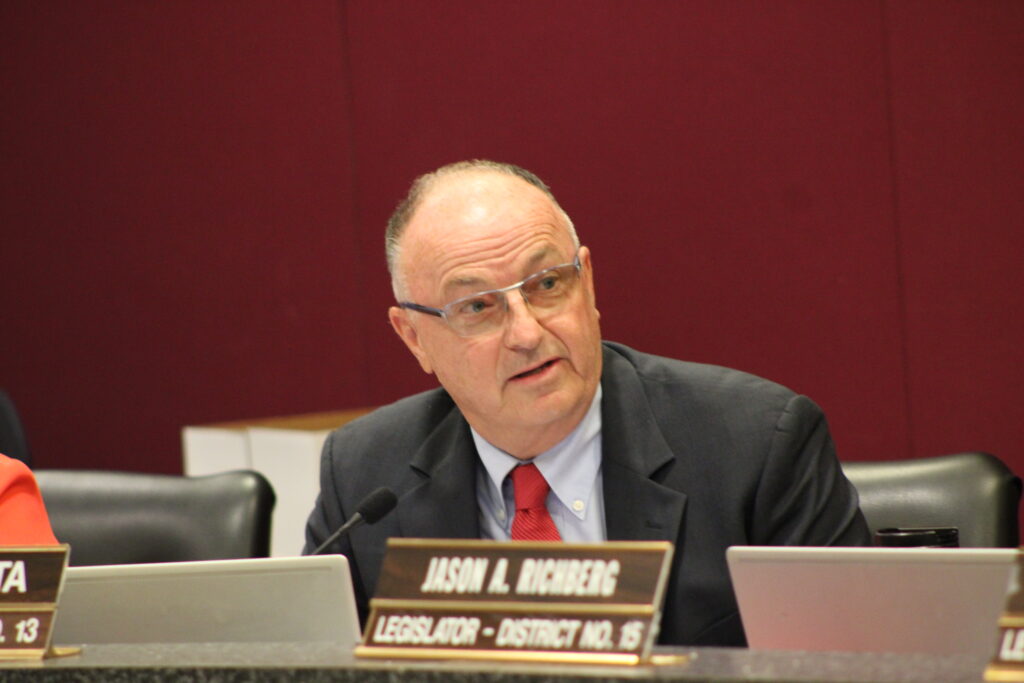
Legislator Rob Trotta (R-Fort Salonga) (pictured above), a vocal critic of previous administrations’ misappropriations of wastewater funds, expressed his opposition to the bill’s fiscal implications, but remains supportive of wastewater solutions.
“A couple years back in 2020, we [Suffolk County government] drained the Clean Water Fund for $200 million,” said Trotta. To this day, we haven’t paid the $200 million back. Combining this with the quarter cent sales tax, which doesn’t expire for seven years and giving the public figures like a billion dollars for clean water is very disingenuous.”
Trotta said that if the Legislature had the prerogative to raise taxes, it would be a “very different vote,” as constituents would likely be displeased at higher taxes imposed by the Legislature. Trotta said he is “disappointed” in the new [Romaine] administration and his colleagues for not “saving and scratching money together, even though we have almost a billion dollars in surplus.”
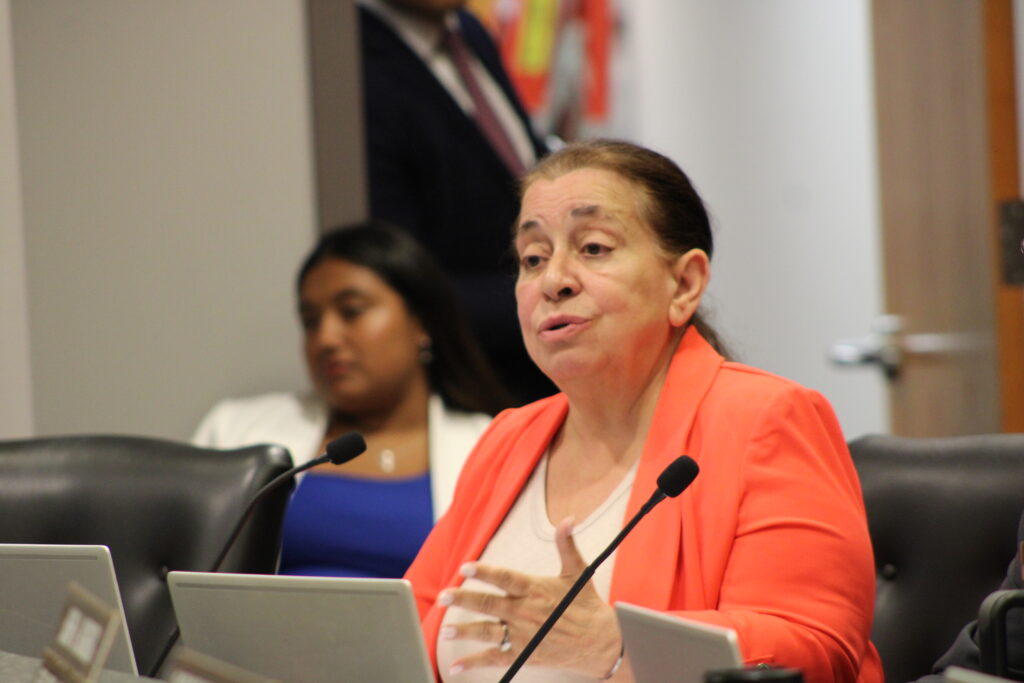
Legislator Leslie Kennedy (R-Nesconset) (pictured above) has long agreed with Trotta’s sentiments on raising taxes, saying that many of her constituents cannot afford groceries, prescriptions, and other necessities. She also took issue with the agenda for Tuesday’s meeting, which showed her and Legislator Trotta as absent at the Budget and Finance Committee meeting during which I.R. 1461 was discussed. She stated that she and Trotta stated their reasons for voting against the bill and that they were, in fact, present.
Legislator Steve Englebright (D-Setauket) spoke in support of the measure, but said that he shares “some concerns” with Kennedy and Trotta. He said that while the bill is not “perfect,” it is “appropriate.”
“We’re really working against time when we’re talking about the contamination of our sole-source of drinking water,” said Englebright. “I think we can go before our public and we can say we’re in a process, not an event, and the process is one of making adjustments as needs present themselves. Right now, part of the need is to do some catching up on investment into sewers. But in the long term, I think we need to rebalance in five years to make it more congruent with the percentage of the problem and the application of the dollars.”
Legislator Rebecca Sanin (D-Huntington Station) said that Suffolk County needs a “dedicated funding source to eliminate these polluting wastewater systems now” and that the best way to do so is by putting I.R. 1461 on the ballot for voters to choose.
“This is a small price to pay for the immense benefits it will bring to our water quality, to our public health, and to our local economy, so I’m very proud to support this measure,” said Sanin.
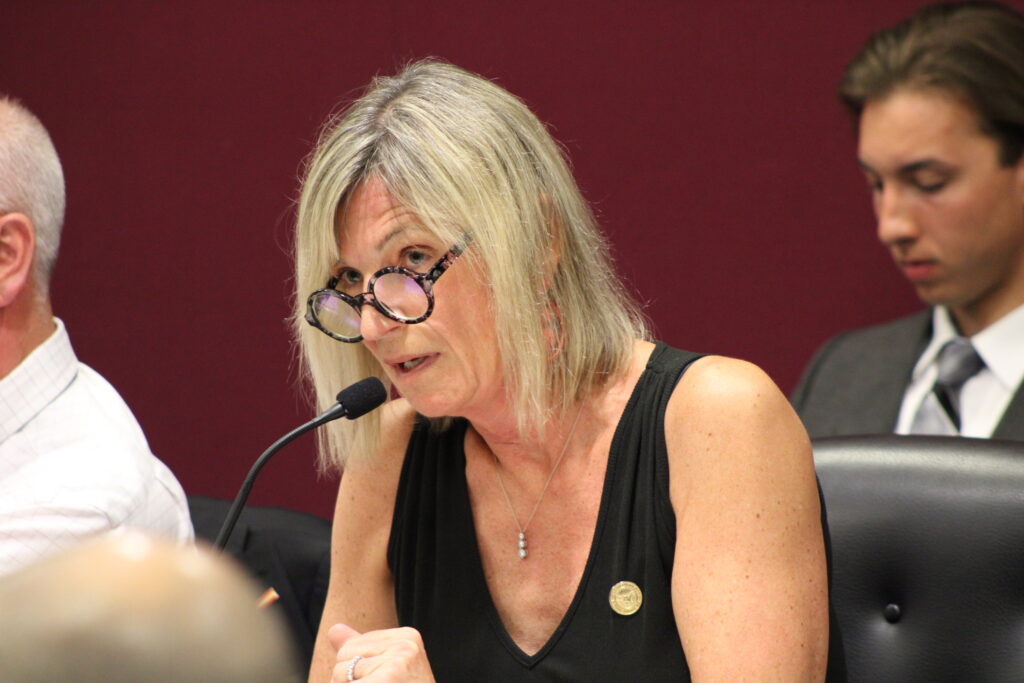
Legislator Stephanie Bontempi (R-Centerport) (pictured above) said that while she voted against last year’s resolution, she is “confident that this amended version” will accomplish the goals of wastewater solutions across the county. She also spoke of the current surplus relative to continuous revenue streams over the years.
“We keep talking about the billion dollars we have in reserves. We need a continuous revenue stream for this big long-term project that we have,” said Bontempi. “So, we cannot be depleting our reserves. We need those for lawsuits. The county has several lawsuits pending and we need it for a rainy day.”
The lawsuits to which Bontempi referred are lawsuits the County faces for misappropriating funds from previous voter-approved sales tax referenda designated for wastewater solutions.
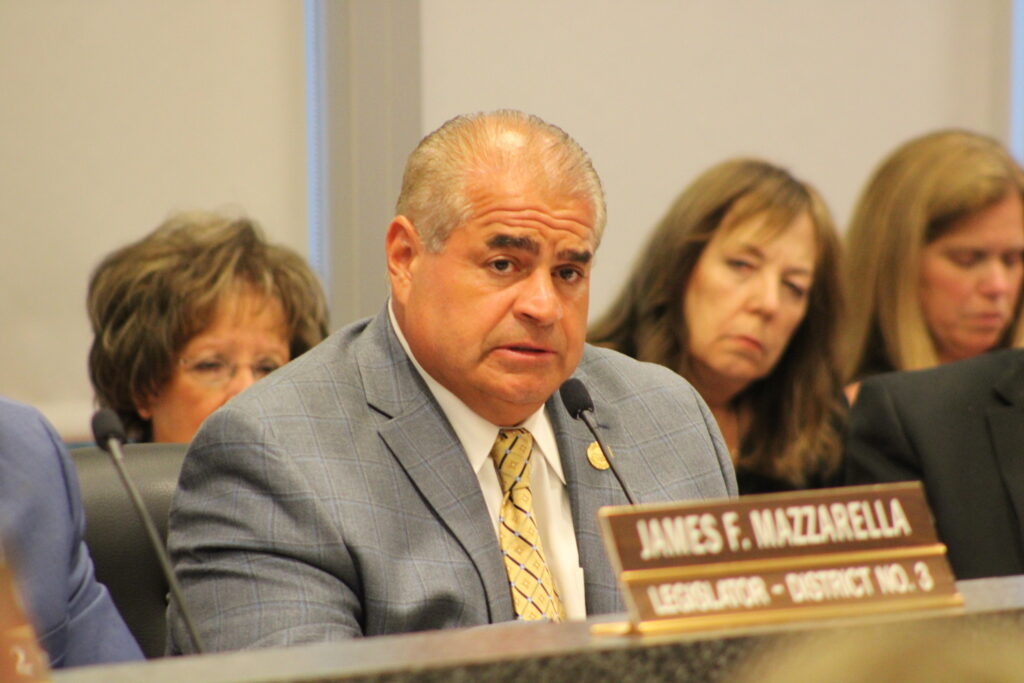
Majority Leader Nick Caracappa (C-Selden) (pictured above) said that despite some disagreements in the horseshoe, he can defend his colleagues in that they all have “respect for the environment.” Caracappa also said that revenue streams will be further padded by increased tourism funds from beaches and parks, a direct byproduct of wastewater solutions that keep the waterways open during the peak season.
“We had $6 billion in revenues from tourism on Long Island last year,” said Caracappa, adding that the Water Quality Act will see many county residents “contributing to our environment, protection, economic development, and creating more opportunities here in Suffolk County.”
Legislator Tom Donnelly (D-Deer Park) thanked Executive Romaine for making parts of Babylon and western Islip priority areas in sewering.
Legislator Dominick Thorne (R-Patchogue) said that he voted to recess the measure last year and took the time to “worry about the tax base and what’s right for our county and environment.” He added that I.R. 1461 is the “right approach.”
Legislator Ann Welker (D-Southampton) used an anecdote about Mill Pond in Water Mill that previous generations in her family would enjoy for swimming and recreation. She said her support from the bill comes, in part, from the fact that the water quality in the pond has “degraded” beyond its classical uses.
Deputy Presiding Officer Steve Flotteron (R-Brightwaters) reaffirmed his support for the bill and echoed his spearheading of the recently-publicized inaugural Fire Island sewer study.
“20 to 30% of the nitrogen problem in the Great South Bay is coming from Fire Island,” said Flotteron. “Fire Island is, besides our backyard, is our health, our bay, tourism, the tax base, and all those different businesses. We have to deal with some real problems.”
Flotteron added that conversations are in place for funding for sumps, road runoff, stream flow, and drain water recharging, as per concerns from colleagues on capital budgeting.
Minority Leader Jason Richberg (D-West Babylon) thanked the scientists, the County Health Department, the Water Quality Department, and the economic development team for their work on the resolution over the past fifteen years.
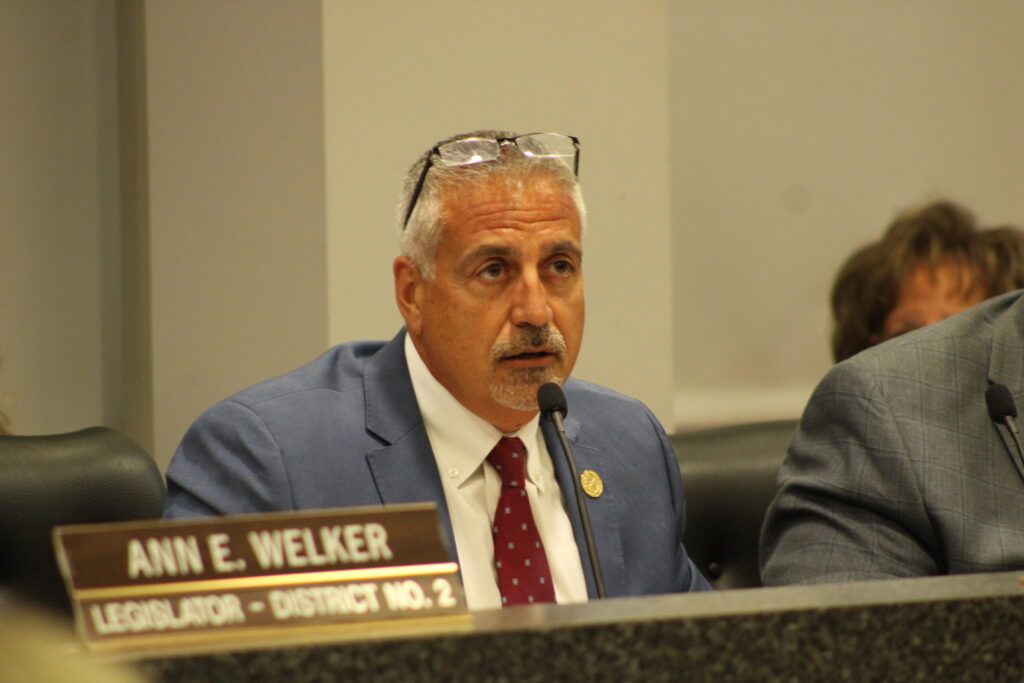
Legislator Jim Mazzarella (R-Moriches) (pictured above) said that many differing viewpoints on the legislation is “perspective,” adding that his district, which encompasses Mastic Beach Shirley, the Moriches, and Brookhaven hamlet, is one of the lowest lying communities in Suffolk County and is no stranger to storms and high tides.
“From a taxpayer point of view, people know that this is important. They understand that they have bills to pay, but they prioritize,” said Mazzarella.
“I believe this is a priority for folks, and that’s why I’m proud to support it.”
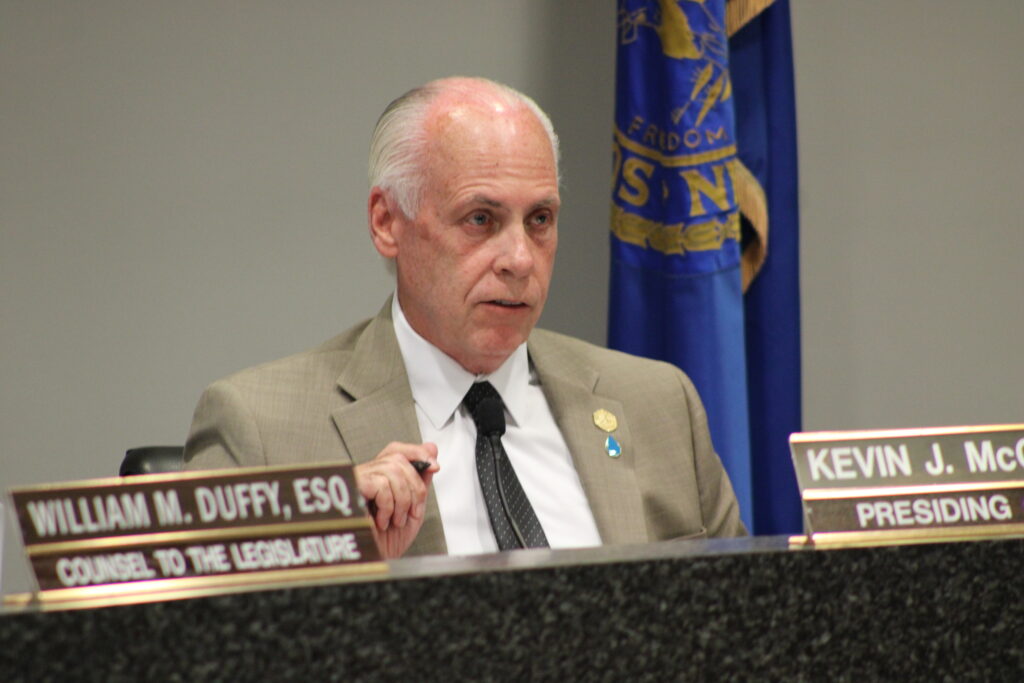
Presiding Officer Kevin McCaffrey (R-Lindenhurst) (pictured above) closed the comments before the vote.
“Different areas may need sewers and other areas may need advanced wastewater systems. I think we dug in when we needed to and took the slings and the arrows along with many of my colleagues here,” said McCaffrey.
“I think at the end of the day, we walked away in a better place than we did before. For us, our children, our grandchildren, we are going to look back and say that we made a difference here.”
The bill passed in a 15-2 vote, with Legislator Trish Bergin (R-East Islip) absent. Legislators Trotta and Kennedy were the only votes against the resolution. Legislators Catherine Stark (R-Riverhead), Welker, Caracappa, Englebright, Sam Gonzalez (D-Brentwood), and Richberg voted to cosponsor the legislation.
I.R. 1461 now enters another period of public portion before heading to Executive Romaine’s desk for his signature.



